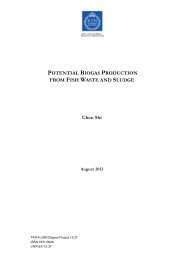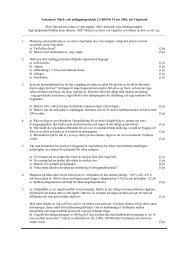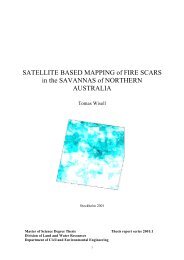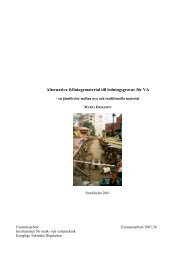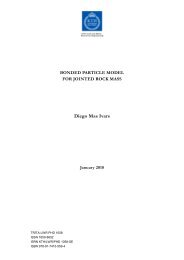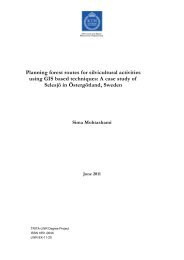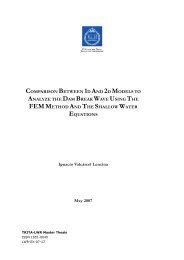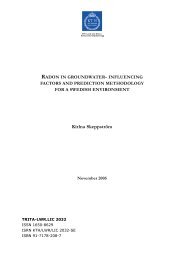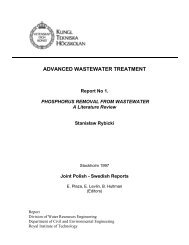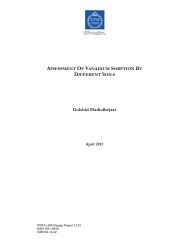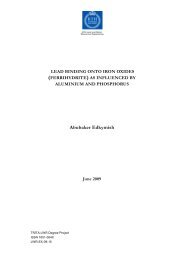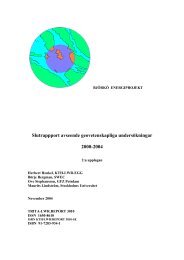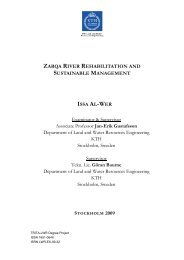Water <strong>sources</strong>, <strong>infrastructure</strong>, <strong>space</strong> <strong>and</strong> <strong>the</strong> <strong>dynamics</strong> <strong>of</strong> environmental diseases in Saboba District: Using GISIdentify <strong>the</strong> most pressing environmental problems in <strong>the</strong> district.Identify whe<strong>the</strong>r women <strong>and</strong> men are proportionately affected byenvironmental diseases.Use GIS to identify <strong>the</strong> spatial <strong>dynamics</strong> <strong>of</strong> environmentaldiseases.Identify <strong>the</strong> causes <strong>of</strong> high rates <strong>of</strong> environmental diseases in <strong>the</strong>district <strong>and</strong> provide recommendations based on <strong>the</strong> study.Expected outcomeThe research is expected to; 1) contribute to knowledge in reducingenvironmental diseases in general <strong>and</strong> 2) broaden <strong>the</strong> knowledge <strong>of</strong> <strong>the</strong>use <strong>of</strong> GIS as a tool to analyse health issues.Hypo<strong>the</strong>sis <strong>and</strong> propositionsIn this study, it is hypo<strong>the</strong>sised that; <strong>the</strong>re is a significant relationshipbetween distances to <strong>the</strong> main town, roads, <strong>water</strong>courses, <strong>the</strong> type <strong>of</strong>l<strong>and</strong> cover <strong>and</strong> elevation on one h<strong>and</strong> <strong>and</strong> environmental diseases on <strong>the</strong>o<strong>the</strong>r in Saboba district. In this study, two propositions are made. Theseare; 1). Environmental diseases are increasing at faster rates in Sabobadistrict <strong>and</strong> 2) environmental diseases affect more women than men.Rationale for <strong>the</strong> studyDue to <strong>the</strong> increasing rates <strong>of</strong> <strong>water</strong>-related diseases shown above byWHO <strong>and</strong> UNICEF (2004) <strong>and</strong> IWMI (2000) <strong>and</strong> <strong>the</strong> growing need forinterventions aimed at disease prevention <strong>and</strong> control, it is crucial tocarry out research into <strong>the</strong> spatial <strong>dynamics</strong> <strong>of</strong> <strong>the</strong>se diseases. This studywill enable stakeholders in <strong>the</strong> case <strong>of</strong> Saboba district to design areaspecificintervention measures, as well as proactive decisions through <strong>the</strong>integration <strong>of</strong> <strong>water</strong> management <strong>and</strong> health policies. For example, <strong>the</strong>study on <strong>the</strong> spatial dimension <strong>of</strong> <strong>the</strong>se diseases will provide <strong>the</strong> neededinformation for <strong>the</strong> development <strong>of</strong> effective <strong>water</strong> <strong>and</strong> healthintervention policies suitable for each specific community. Also, byidentifying <strong>the</strong> past <strong>water</strong> management practices, <strong>the</strong> stakeholders will beable to integrate <strong>water</strong> <strong>and</strong> health policies in a way that is economically<strong>and</strong> culturally feasible in Saboba district, <strong>and</strong> Ghana in general.DelimitationThis research did not deal with <strong>the</strong> chemical components <strong>of</strong> <strong>water</strong> <strong>and</strong><strong>the</strong> biology <strong>of</strong> diseases, due largely to insufficient knowledge in <strong>water</strong>chemistry <strong>and</strong> molecular biology <strong>and</strong> epidemiology respectively. Also,time, cost <strong>and</strong> resource constraints did not permit administration <strong>of</strong>questionnaires in all communities in <strong>the</strong> district; hence only fivecommunities were sampled. It is also worth to note that when <strong>the</strong>research began, <strong>the</strong> study area was originally limited to Saboba subdistrict(part <strong>of</strong> Saboba/Chereponi district). However, in February, 2008,<strong>the</strong> study area gains a full district status <strong>and</strong> named Saboba district. Theo<strong>the</strong>r part is named Chereponi district. Such changes are subsequentlyeffected, but some few aspects <strong>of</strong> <strong>the</strong> description <strong>of</strong> <strong>the</strong> study area stillmaintain features <strong>of</strong> <strong>the</strong> old district, since <strong>the</strong>re has not yet been anyclear demarcation <strong>of</strong> <strong>the</strong> nor<strong>the</strong>rn boundary between <strong>the</strong> two districts. Iam also aware <strong>of</strong> <strong>the</strong> classification <strong>of</strong> <strong>water</strong> related diseases as <strong>water</strong> borne,<strong>water</strong> washed, <strong>water</strong> based etc, but as this is not <strong>the</strong> focus <strong>of</strong> <strong>the</strong> research,<strong>water</strong> related as used here encompasses all <strong>of</strong> <strong>the</strong>se diseases. It is alsoworth to note that, though <strong>the</strong> focus <strong>of</strong> this study is on <strong>water</strong> relateddiseases, RTI has been included for readers to see <strong>the</strong> trends <strong>of</strong>environmental diseases in <strong>the</strong> district beyond those related to <strong>water</strong>.3
Mat<strong>the</strong>w Biniyam KursahTRITA LWR Master ThesisLiterature reviewIn order to achieve <strong>the</strong> 7 th Millennium Development Goal – to “half by2015 <strong>the</strong> proportion <strong>of</strong> people without sustainable access to safedrinking <strong>water</strong> <strong>and</strong> basic sanitation”, Ghana needs to underst<strong>and</strong> issuessuch as causes <strong>of</strong> <strong>water</strong> mismanagement/scarcity <strong>and</strong> impact on health,<strong>the</strong> effects, difficulties in managing <strong>water</strong> re<strong>sources</strong>, information needsfor efficient <strong>water</strong> management <strong>and</strong> finally <strong>the</strong> managing strategies. Thissection extensively looks at <strong>the</strong>se issues.Causes <strong>of</strong> <strong>water</strong> scarcityAccording to International Water Management Institute, IWMI, (2000)by 2025 <strong>water</strong> shortages will be more prevalent among poorer countriessuch as in Sub-Saharan Africa (SSA). The institute attributed this tolimited re<strong>sources</strong>, rapid population growth <strong>and</strong> climatic changes. It alsostated that, generally, <strong>the</strong> developed countries <strong>of</strong> North America <strong>and</strong>Europe will not see a serious threat to <strong>water</strong> supply by 2025. This is notonly due to <strong>the</strong>ir relative wealth, but more importantly; <strong>the</strong> populationwill “match up” with <strong>the</strong> available <strong>water</strong> re<strong>sources</strong>. This shows that <strong>the</strong>predicted <strong>water</strong> stress has both human (population growth) <strong>and</strong> natural(climatic) causes.Centre for Strategic <strong>and</strong> International Studies-S<strong>and</strong>ia NationalLaboratories, CSIS-SNL, (2005) is also <strong>of</strong> <strong>the</strong> view that acrossdeveloping <strong>and</strong> developed regions, poor governance <strong>and</strong>mismanagement <strong>of</strong> natural re<strong>sources</strong>, toge<strong>the</strong>r with high populationgrowth, rising level <strong>of</strong> urbanisation <strong>and</strong> economic development have ledto a growing disparity between <strong>water</strong> supply <strong>and</strong> dem<strong>and</strong>. Among o<strong>the</strong>rthings, CSIS-SNL (2005) concluded that this trend is leading <strong>the</strong> worldtowards a tipping point in <strong>the</strong> history <strong>of</strong> mankind.Like CSIS-SNL, (2005), Gardner-Outlaw <strong>and</strong> Engelman (1997) statedthat <strong>the</strong> global trends in population growth, economic development,industrialisation, <strong>and</strong> urbanisation, among o<strong>the</strong>rs, are pushing all <strong>of</strong>humanity towards a period marked by unexpected <strong>water</strong> scarcity, poorer<strong>water</strong> quality <strong>and</strong> deterioration <strong>of</strong> sanitation conditions. The writersconcluded that by 2050, a quarter <strong>of</strong> <strong>the</strong> world’s population will live in acountry experiencing persistent <strong>water</strong> shortages.According to Garrett Hardin’s (1968) Science essay, The Tragedy <strong>of</strong> <strong>the</strong>Commons, natural re<strong>sources</strong> such as <strong>water</strong> is engulfed in a social trap thatentails rivalry over re<strong>sources</strong> between individual interests <strong>and</strong> <strong>the</strong>common good. Garrett Hardin’s <strong>the</strong>ory is an affirmation <strong>of</strong> Aristotle 1 ,who believes that that which is common to <strong>the</strong> greatest number has <strong>the</strong> least carebestowed upon it. It can <strong>the</strong>refore be argued that <strong>the</strong> mismanagement <strong>of</strong><strong>water</strong> re<strong>sources</strong> (common good) such as rivers, lakes <strong>and</strong> o<strong>the</strong>r <strong>water</strong>bodies are suffering from Garrett Hardin’s tragedy <strong>of</strong> <strong>the</strong> commons.Effects <strong>of</strong> scarcity <strong>of</strong> <strong>water</strong> re<strong>sources</strong>Postel <strong>and</strong> Wolf (2001) stated that <strong>water</strong> stress can cause conflict orintensify conflicts <strong>and</strong> political tensions that may not have been directlycaused by <strong>water</strong> scarcity such as Bolivian Water Wars <strong>of</strong> 2000. Gradualreductions over time in <strong>the</strong> quality <strong>and</strong>/or quantity <strong>of</strong> fresh <strong>water</strong> canadd to <strong>the</strong> instability <strong>of</strong> a region by depleting <strong>the</strong> health <strong>of</strong> a population<strong>and</strong> obstructing economic development, especially in <strong>the</strong> downstreamareas <strong>of</strong> distressed river basins. The writers believe that regions that aremore prone to <strong>water</strong> related conflicts include Sub-Saharan African (SSA),1 Aristotle, Politics 1261b344
- Page 1 and 2: Supervisor: Ulla MortbergCo-supervi
- Page 3 and 4: Water sources, infrastructure, spac
- Page 5 and 6: Water sources, infrastructure, spac
- Page 7 and 8: Water sources, infrastructure, spac
- Page 9 and 10: Water sources, infrastructure, spac
- Page 11 and 12: Water sources, infrastructure, spac
- Page 13 and 14: Water sources, infrastructure, spac
- Page 15 and 16: Water sources, infrastructure, spac
- Page 17: Matthew Biniyam KursahTRITA LWR Mas
- Page 21 and 22: Matthew Biniyam KursahTRITA LWR Mas
- Page 23 and 24: Matthew Biniyam KursahTRITA LWR Mas
- Page 25 and 26: OberadeYusungaManieBilyimbaMatthew
- Page 27 and 28: Matthew Biniyam KursahTRITA LWR Mas
- Page 29 and 30: Matthew Biniyam KursahTRITA LWR Mas
- Page 31 and 32: Matthew Biniyam KursahTRITA LWR Mas
- Page 33 and 34: Matthew Biniyam KursahTRITA LWR Mas
- Page 35 and 36: Matthew Biniyam KursahTRITA LWR Mas
- Page 37 and 38: Matthew Biniyam KursahTRITA LWR Mas
- Page 39 and 40: Matthew Biniyam KursahTRITA LWR Mas
- Page 41 and 42: PercentagePercentageMatthew Biniyam
- Page 43 and 44: Matthew Biniyam KursahTRITA LWR Mas
- Page 45 and 46: Matthew Biniyam KursahTRITA LWR Mas
- Page 47 and 48: Matthew Biniyam KursahTRITA LWR Mas
- Page 49 and 50: BilyimbaMatthew Biniyam Kursah Nadu
- Page 51 and 52: ManieBilyimbaBaguliMatthew Biniyam
- Page 53: ManieBilyimbaMatthew Biniyam Kursah
- Page 56 and 57: Matthew Biniyam KursahTRITA LWR Mas
- Page 58 and 59: Matthew Biniyam KursahTRITA LWR Mas
- Page 60 and 61: Matthew Biniyam KursahTRITA LWR Mas
- Page 62 and 63: Matthew Biniyam KursahTRITA LWR Mas
- Page 64 and 65: Matthew Biniyam KursahTRITA LWR Mas
- Page 66 and 67: PercentagesPercentagesMatthew Biniy
- Page 68 and 69:
PercentagesMatthew Biniyam KursahTR
- Page 70 and 71:
Matthew Biniyam KursahTRITA LWR Mas
- Page 72 and 73:
Matthew Biniyam KursahTRITA LWR Mas
- Page 74 and 75:
Matthew Biniyam KursahTRITA LWR Mas
- Page 76 and 77:
Matthew Biniyam KursahTRITA LWR Mas
- Page 78 and 79:
Matthew Biniyam KursahTRITA LWR Mas
- Page 80 and 81:
Matthew Biniyam KursahTRITA LWR Mas
- Page 82 and 83:
Matthew Biniyam KursahTRITA LWR Mas
- Page 84 and 85:
Matthew Biniyam KursahTRITA LWR Mas
- Page 86 and 87:
Matthew Biniyam KursahTRITA LWR Mas
- Page 88 and 89:
Matthew Biniyam KursahTRITA LWR Mas



